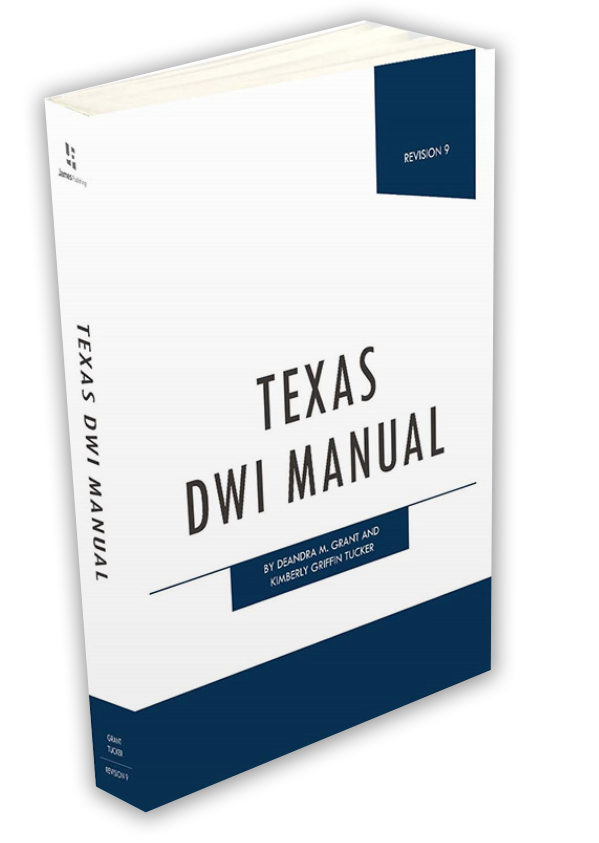
Do You Need Legal Help?

"Deandra Grant Law fights hard for their clients and is always willing to go above and beyond. They are the best firm for DWI cases in DFW and beyond. Definitely hire them to represent you in any pending cases."
- P. Williams

"Deandra Grant made a tough situation so much better. She listened to my concerns and helped me so much with my case. I would recommend her to anyone needing legal services."
- M. Haley

"Deandra Grant Law handled my case with diligence and professionalism. Deandra Grant's reputation is stellar and now I know why. She has a team of individuals who provide quality service."
- N. Coulter
As Seen On





A Fighting Team On Your Side
Since 1994 when our doors opened, Deandra Grant Law has helped thousands of clients get their DWI charges reduced or dismissed. We're ready to fight on your behalf.

Managing Partner
Partner & Criminal Division Chief
Criminal Division Senior Associate
Criminal Division DWI Trial Chief
Immigration Division Chief & Criminal Division Deputy Chief
Criminal Division Associate


Texas DWI Manual
By Attorney Deandra Grant
Fighting DWI charges can present many challenges, not only for the defense, but prosecutors as well. This is why it is important to be armed with the necessary knowledge so you understand the DWI process.
Attorney Deandra M. Grant is the co-author of the Texas DWI Manual, offering legal advice to both clients and fellow attorneys. Fighting DWI charges can present may challenges, not only for the defense, but prosecutors as well. This is why it is important to be armed with the necessary knowledge so that you understand the DWI criminal process.
Learn MoreFrequently Asked DWI Questions
The Texas DWI attorneys at Deandra Grant Law are backed by over 25 years of combined experience handling cases just like yours. Take a look at our answers to the most frequently asked questions surrounding DWI charges. For further information, reach out to our aggressive team of DWI lawyers today.
Call us right away to discuss the details of your case. Our lawyers also represent clients in Fort Worth, Denton, Austin, Allen, Collin County, and throughout northern Texas.
Frequently Asked Questions about DWI in Texas
No. You have 15 days from the day you are served your Notice of Suspension to request a hearing regarding your driver’s license (called an ALR hearing). If you do not request a hearing, your license will be suspended on the 40th day after Notice of Suspension is served. If you consented to a blood draw, the police will not normally take your driver’s license. Notice of Suspension will be mailed to you if DPS receives a blood test result of .08 or greater. You only have 10 days to request a hearing once you receive a Notice of Suspension letter from DPS.
In certain circumstances a DLD may be required while your case is pending. There may be alternatives that would work for you that a skillful and competent attorney from our firm can discuss with you.
If you’ve been accused of driving while intoxicated, you will go through administrative and criminal processes. The administrative process is to determine whether your driver’s license should be suspended and is not concerned with your guilt or innocence. If the Department of Public Safety determines that you were lawfully arrested and refused or failed a chemical test, your driver’s license may be suspended for 180 days (for refusing) or 90 days (for failing).
The administrative penalties are separate from the criminal punishments you could face. Upon a conviction for a first-time DWI, you may be fined up to $2,000, incarcerated for 3 to 180 days, and/or lose your driving privileges for up to 1 year.
If you were charged with a second DWI, the potential penalties you may face substantially increase.
First, if you refused or failed the chemical test, you may face a lengthier administrative driver’s license suspension – the one imposed by the Department of Public Safety before your case is completed. The first time you refuse a blood or breath test, you may lose your driving privileges for 180 days. But the second time you do so, you’ll be without your driver’s license for 2 years. If you failed the chemical test (meaning you had an alcohol concentration of .08 or higher) within 10 years of a prior refusal or failure, the administrative driver’s license suspension jumps from 90 days to 1 year.
And those are just the administrative penalties. If you’re found guilty of a second DWI offense, you also face harsher criminal punishments. A first DWI is a Class B misdemeanor with a minimum term of confinement of 3 days and a maximum of 180 days, a fine of up to $2,000, and/or a driver’s license suspension for up to 1 year. A second offense is a Class A misdemeanor, which is punishable by a minimum jail term of 1 month and a maximum of 1 year, a fine of up to $4,000, and/or a driver’s license suspension of up to 2 years.
There are many factors that determine how long a case will last. Cases that are on the trial docket will take longer to resolve. The majority of our DWI cases are resolved within six months to one year in Collin County and eight months to two years in Dallas County.
The punishment will vary depending upon the circumstances of your case and whether this is your first, second or subsequent offense. By working with a defense lawyer and fighting your charges, you have the chance to avoid a conviction and therefore keep your freedom.
Because a lot is at stake in a DWI case, there are certain actions you should take immediately to help protect your rights, future, and driving privileges.
First, exercise your right to remain silent. As with any criminal matter, whatever you say or do at the beginning of your case can have substantial impacts on the outcome.
Next, contact a skilled attorney to discuss your situation and legal options. With a thorough understanding of everything that happened from your stop to the charges being filed, your lawyer can determine what defenses can be mounted and what steps to take to resolve your case.
Then, request an Administrative License Revocation hearing. Your attorney can also represent you at this proceeding and fight hard to contest the suspension of your driver’s license.
Finally, work closely with your attorney to aggressively challenge the drunk driving accusation.
An attorney can begin working to protect your rights and interests by challenging the prosecution’s case and the evidence against you. This may include challenging field sobriety test results, breath test results or blood tests results. An attorney’s representation would also include presence at any and all court appearances, including trial.
If a police officer pulls you over on suspicion of driving while intoxicated, they may ask you to blow into a portable breath test machine. They may have you provide multiple samples on the roadside before arresting you for the offense. Note that this Preliminary Alcohol Screening (PAS) is not the one drivers must take under the implied consent law. The PAS essentially serves as a way for the officer to establish probable cause for your arrest. You can refuse this initial screening without facing administrative consequences.
After you’ve been lawfully arrested, the officer might ask you to submit to another breath test. You are required to take this test. However, believing that you had already satisfied the testing requirement when you blew into the machine on the side of the road, you might refuse to provide another breath sample. This refusal may lead to the suspension of your driver’s license for 180 days.
If you’ve been arrested for DWI and you refuse or fail a chemical test, you face an immediate driver’s license suspension by the Department of Public Safety. To contest this action, you must request an Administrative License Revocation hearing. Depending on whether the arresting officer confiscated your driver’s license on the spot or you received a notice in the mail of your driver’s license suspension, you have 15 or 20 days to request the hearing. If you do not, the loss of your driving privileges will take effect 40 days after you were notified of the suspension.
However, if you do request the hearing, you can present your case in front of an Administrative Law Judge (ALJ) to fight to maintain your driving privileges. If the ALJ sides with you, you may keep your driver’s license. However, if they determine that the Department of Public Safety proved the case, your driver’s license suspension will be upheld.
Yes. Your lawyer can contact the Department of Public Safety to schedule your administrative license revocation hearing (ALR hearing) and can represent you at your hearing in order to help you reach a better outcome. Your driving privileges are extremely important, and a skilled lawyer’s representation at your hearing may help you keep them.
Specific penalties may vary, but in general a defendant may expect to face: imprisonment, probation, community service, driver’s license suspension, fines, surcharges and more.
It is highly probable that having a DWI conviction on your criminal record will mean that you may have difficulty finding employment. When a potential employer conducts a pre-employment background search, your DWI conviction will show up. Many employers do not like to hire employees who have criminal records.
Client Reviews
![]()
“Deandra Grant Law handled my case with diligence and professionalism. Deandra Grant’s reputation is stellar and now I know why. She has a team of individuals who provide quality service.”






